“Excuse me, can I ask what you’re doing here?” a resident in a southeast Washington neighborhood asks as Sean Kennedy and Erin Gleeson get out of their truck and scour the streets.
The sign on their back windshield, “Bees Onboard,” gives them away.
Kennedy, 58, and Gleeson, 36, are beekeepers. They and their colleagues have been deemed essential workers by the District of Columbia government in the middle of a pandemic.
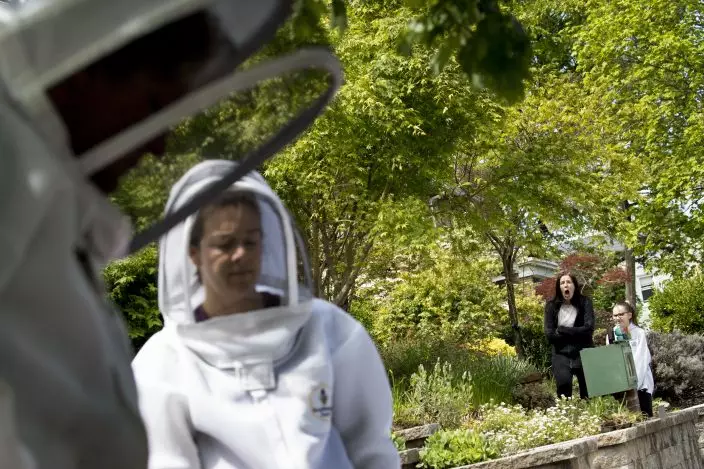
Amy Caspari, second from right, and her daughter Ana Gray, 12, right, watch as beekeepers Sean Kennedy, left, and Erin Gleeson, second from left, prepare to capture a swarm of honey bees and relocate them to a bee hive, Friday, May 1, 2020, in Washington. The District of Columbia has declared beekeepers as essential workers during the coronavirus outbreak. If the swarm isn’t collected by a beekeeper, the new hive can come to settle in residential backyards, attics, crawlspaces, or other potentially ruinous areas, creating a stinging, scary nuisance (AP PhotoAndrew Harnik)
On this day April, the pair is responding to a phone call about a swarm of honeybees. At first glance it appears as if it might be a bad tip. Kennedy looks down a fence line while Gleeson walks across the street and past a few houses.
“Let’s check the alley,” Kennedy says, and quickly they’re back in their truck. The truck moves slowly as they scan fences, trees, and rooflines — all places where bee swarms might stop.
As they reach the end of the alley, they find what they were looking for: a dark mass about 2 feet long that most casual observers would walk by without noticing. Upon closer inspection, this brown mass moves with quiet activity, thousands of bees huddling with no nest to protect them.
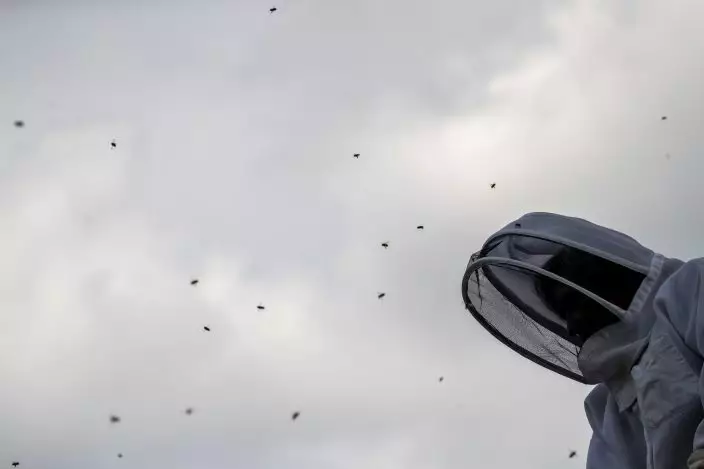
Honeybees fly around beekeeper Sean Kennedy as he works to relocate a swarm from a fence line in a neighborhood in Anacostia, Monday, April 20, 2020, in Washington. Over the last year, beekeepers in the U.S. lost 43.7% of their honeybee colonies, according to the Bee Informed Partnership. (AP PhotoAndrew Harnik)
Within two hours, this cluster of bees will be collected, driven across town and given a new home on some of the most desirable real estate in the city.
If a hive is thriving and becomes too large for its own space, the queen will take half the hive and set off to find a new location to start a new hive. If this swarm isn’t collected up by a beekeeper, the new hive can settle into backyards, attics, crawlspaces, office buildings, or high traffic public spaces, creating a nuisance that can alarm some people.
“Bees are not aggressive unless you invade their home or step on them,” Kennedy says. “But they do put people off. Some people are just innately afraid of things that sting and maybe that’s primal and necessary, but if you have them in your office building or you have them in your tourist spots, they become a problem. So, it’s good to catch them in that middle step when we can just put them somewhere where they are welcome.”
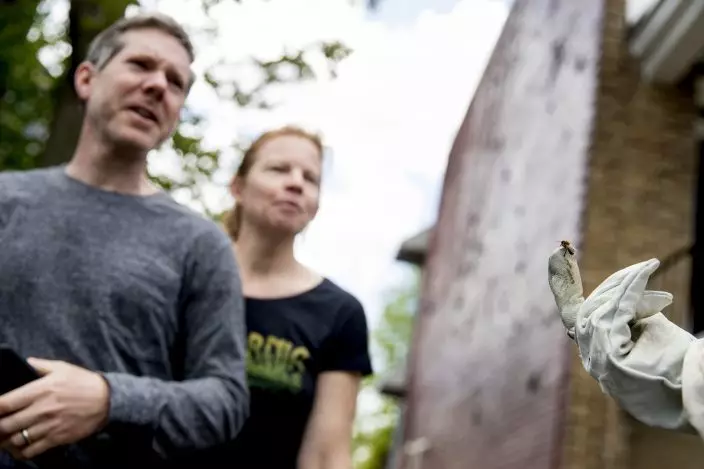
Homeowners Brett Kay and Monika Ringuette, at left, hesitantly take a closer look at a bee that rests beekeeper Erin Gleeson's glove after she helped capture a swarm of honey bees to relocate them to a bee hive, Friday, May 1, 2020, in Washington. “Beekeepers needed to be essential because often the hives that they keep are not on their property,” says Tommy Wells, director of the D.C. Department of Energy & Environment and a former member of the City Council. “So, they need to be able to travel and get to their bee colonies.” (AP PhotoAndrew Harnik)
For the past five years, the D.C. Beekeepers Alliance has responded to calls from residents about bee swarms. These beekeepers call themselves the “Swarm Squad” and will come to all areas of the region to take away unwanted bees and give them a home, with the added benefit of collecting honey.
Last year the group responded to just 12 calls; this year has been especially busy.
“We had on the first swarm call day of this year, as many calls as we had in all of last year,” says Toni Burnham, the group's president, who estimates receiving calls so far about 60 to 75 swarms.
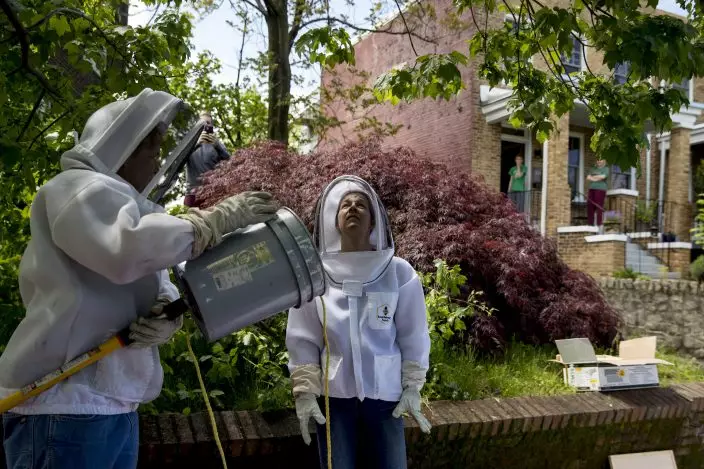
Beekeepers Sean Kennedy, left, and Erin Gleeson, right, prepare to capture a swarm of honey bees and relocate them to a bee hive, Friday, May 1, 2020, in Washington. The District of Columbia has declared beekeepers as essential workers during the coronavirus outbreak. If the swarm isn’t collected by a beekeeper, the new hive can come to settle in residential backyards, attics, crawlspaces, or other potentially ruinous areas, creating a stinging, scary nuisance. (AP PhotoAndrew Harnik)
The coronavirus outbreak coincided with the start of warmer weather, when bees naturally begin separating from their hives. When district officials began looking at the possibility of shutting down the city due to the outbreak, Burnham reached out to her contact at the D.C. Department of Energy & Environment.
“When I saw the lockdown happening and really scary quarantining things, I called up our regulators and said essentially, 'If we’re going to catch swarms we need to not be arrested.' They took care of it, she said.
“Beekeepers needed to be essential because often the hives that they keep are not on their property,” says Tommy Wells, the department's director and a former member of the City Council. “So, they need to be able to travel and get to their bee colonies.”
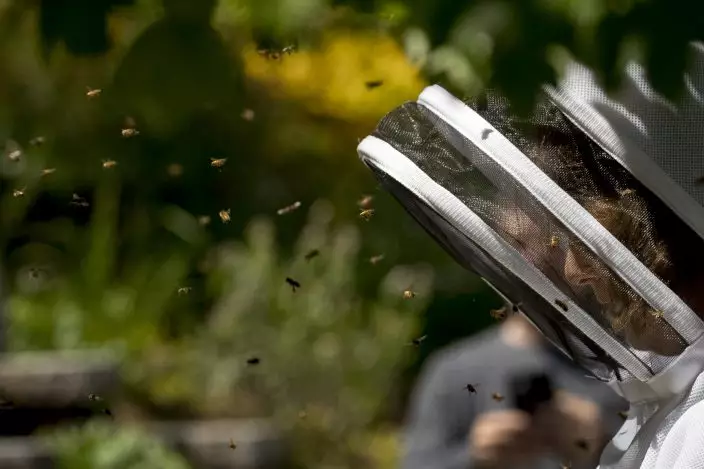
Bees swarm the mask of beekeeper Erin Gleeson as she works to capture a swarm of honey bees and relocate them to a bee hive, Friday, May 1, 2020, in Washington. If a hive is thriving and becomes too large for its own space, the queen will take half the hive and set off to find a new location to start a new hive. If this swarm isn’t collected up by a beekeeper, the new hive can settle into backyards, attics, crawlspaces, office buildings, or high traffic public spaces, creating a nuisance which can be alarming to some people. (AP PhotoAndrew Harnik)
Wells and his team at the agency also are looking at the broader picture and whether there are enough bee colonies in the region. He said if there are colony collapses elsewhere, D.C. bees can be moved where necessary.
Over the past year, beekeepers in the U.S. lost 43.7% of their honeybee colonies, according to the Bee Informed Partnership.
Back out on the street, Kennedy and Gleeson collected their swarm in a specially designed white cardboard box. The box hums and vibrates as they load it into the back of their truck next to their bee suits and tools. They make their way across town though light traffic in record time.
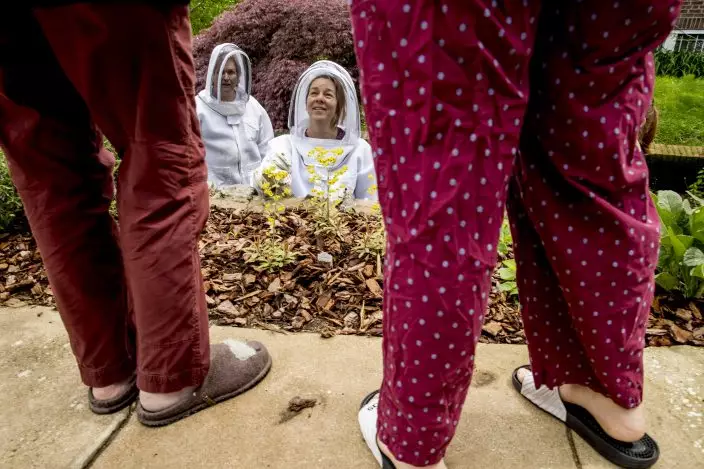
Beekeepers Sean Kennedy and Erin Gleeson speaks with neighbors Laura Takacs, left, and her daughter Maxine Payne, 17, right, after they capture a swarm of honey bees to relocate them to a bee hive, Friday, May 1, 2020, in Washington. (AP PhotoAndrew Harnik)
Jacques Pitteloud, the Swiss ambassador to the U.S., opens the gate to the embassy grounds. They exchange pleasantries as Kennedy and Gleeson don their bee suits.
Pitteloud, wearing a gray sweatshirt with “Washington, D.C” in big block letters across the front, says he was working with the Audubon Society of America to turn parts of the property into a biodiversity reserve when he was approached about beekeeping. “I said, ‘Of course.’”
“Because you know these beautiful gardens that embassies usually have are ecological deserts,” he says. “They are beautiful to look at, but they do not offer the kind of environment that’s conducive to wildlife.
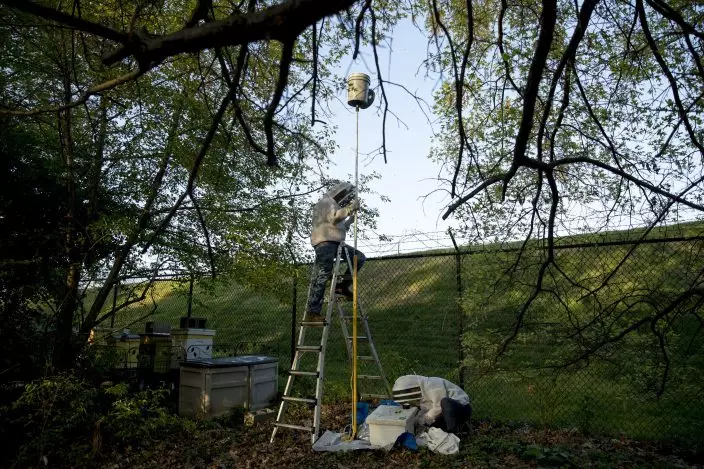
Beekeeper Sean Kennedy, above, with the assistance of fellow beekeeper Erin Gleeson, bottom, prepares a bucket on a pole to capture and relocate a swarm of honeybees in a tree in the American University Park neighborhood in Northwest, Monday, April 20, 2020, in Washington. The District of Columbia has declared beekeepers as essential workers during the coronavirus outbreak. If the swarm isn’t collected by a beekeeper, the new hive can come to settle in residential backyards, attics, crawlspaces, or other potentially ruinous areas, creating a stinging, scary nuisance. (AP PhotoAndrew Harnik)
Collecting swarms of bees is challenging at any time, even more so during a pandemic.
“Erin and I are both very careful in our day-to-day personal lives,” says Kennedy. “So when we work together we don’t worry about having masks on.”
He adds, “Being around a swarm of bees deters a crowd. You don’t want a lot of people gathering and it sort of creates a dynamic that encourages social distancing no matter what’s going on with pandemics in the world. So, it’s a perfect activity to encourage social distancing.”
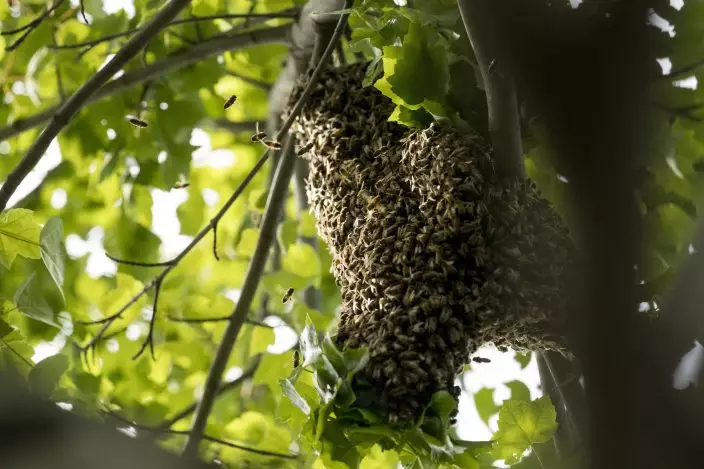
A swarm of honey bees is visible in a tree in Northeast as beekeepers Sean Kennedy and Erin Gleeson prepare to capture them and relocate them to a bee hive, Friday, May 1, 2020, in Washington. If a hive is thriving and becomes too large for its own space, the queen will take half the hive and set off to find a new location to start a new hive. If this swarm isn’t collected up by a beekeeper, the new hive can settle into backyards, attics, crawlspaces, office buildings, or high traffic public spaces, creating a nuisance which can be alarming to some people. (AP PhotoAndrew Harnik)
Even with the virus, seeing someone out on the street in a bee suit can cause people to stop and look. “We do look pretty funny and we are doing some pretty strange things,” says Gleeson.
“Pre-corona, people would have hurried past,” she says. “And now they say, ‘Whoa, what are you doing, can I have a look?’ They stick their heads in the bee box and go, ‘Oh my God.’ It’s great to be able to show them, ’Hey here’s a queen or a drone or a worker.”
Kennedy says beekeeping has helped him combat boredom during the pandemic. “There were a lot of swarms this year and it gave life for the last few months some purpose,” he says.
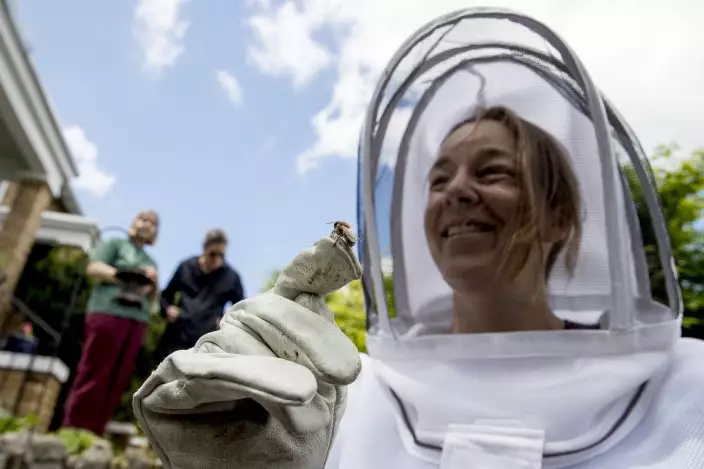
Neighbors hesitantly take a closer look at a bee that rests on beekeeper Erin Gleeson's glove after she helped capture a swarm of honey bees to relocate them to a bee hive, Friday, May 1, 2020, in Washington. (AP PhotoAndrew Harnik)
He calls saving bees “a fairly noble endeavor” that people are enthused about. “It’s a way in difficult times to make a small difference. It’s probably, in the time of social distancing, the best way I could have spent the past few months.”
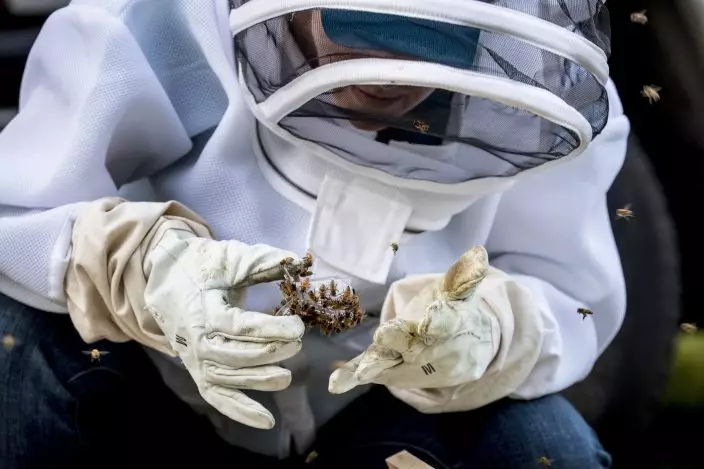
Beekeeper Erin Gleeson pulls out a bee clip containing a queen bee in a new hive location on the corner of the Residence of the Swiss Ambassador, Jacques Pitteloud, the Swiss ambassador to the U.S., has offered for captured swarms of honeybees in Northwest, Monday, April 20, 2020, in Washington. (AP PhotoAndrew Harnik)
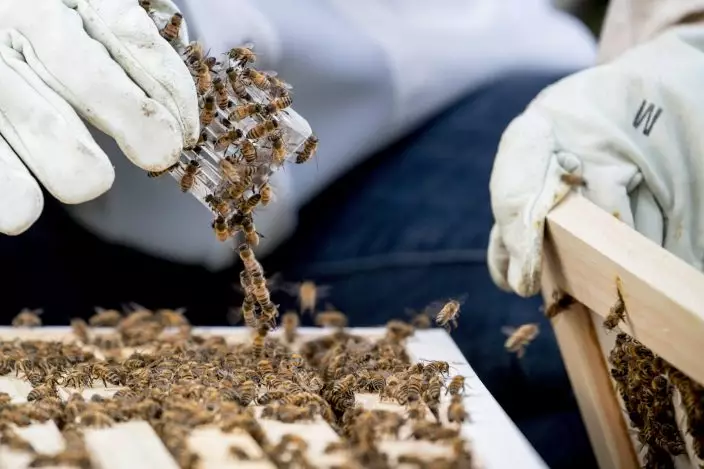
Beekeeper Erin Gleeson pulls out a bee clip containing a queen bee in a new hive location on the corner of the Residence of the Swiss Ambassador, Jacques Pitteloud, the Swiss ambassador to the U.S., has offered for captured swarms of honeybees in Northwest, Monday, April 20, 2020, in Washington. The District of Columbia has declared beekeepers as essential workers during the coronavirus outbreak. If the swarm isn’t collected by a beekeeper, the new hive can come to settle in residential backyards, attics, crawlspaces, or other potentially ruinous areas, creating a stinging, scary nuisance. (AP PhotoAndrew Harnik)
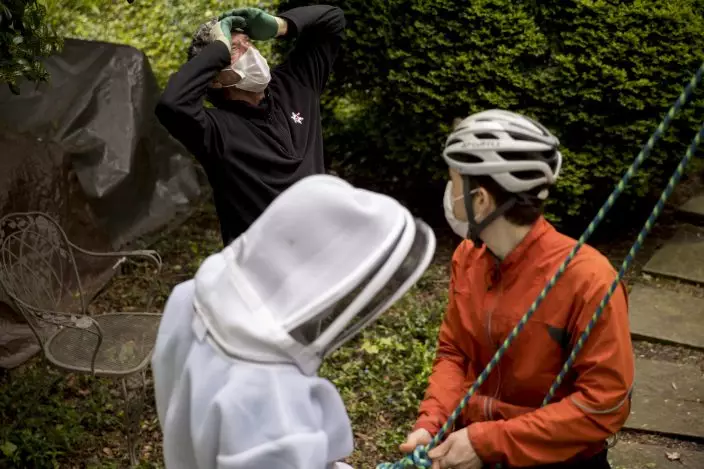
Homeowner Tom Patton, top left, looks at his roof as rock climber Paul Stanton, right, gets ready to belay his beekeeper friend Erin Gleeson, bottom left, as she prepares to scale the side of a home to look for a swarm of honey bees that has gone into an attic space, Saturday, April 25, 2020, in Washington. The District of Columbia has declared beekeepers as essential workers during the coronavirus outbreak. If the swarm isn’t collected by a beekeeper, the new hive can come to settle in residential backyards, attics, crawlspaces, or other potentially ruinous areas, creating a stinging, scary nuisance. (AP PhotoAndrew Harnik)
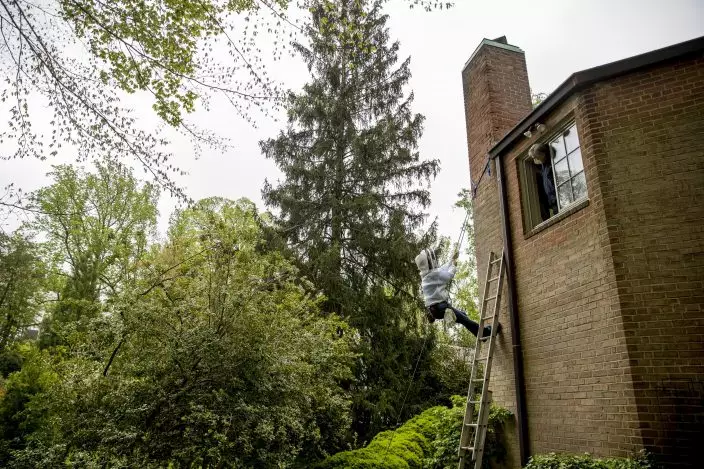
Sean Kennedy, right, watches as fellow beekeeper Erin Gleeson, left, scales the side of a home to look for a swarm of honey bees that has gone into an attic space, Saturday, April 25, 2020, in Washington. “Bees are not aggressive unless you invade their home or step on them,” Kennedy says. “But they do put people off. Some people are just innately afraid of things that sting and maybe that’s primal and necessary but if you have them in your office building or you have them in your tourist spots, they become a problem. So, it’s good to catch them in that middle step when we can just put them somewhere where they are welcome.” (AP PhotoAndrew Harnik)
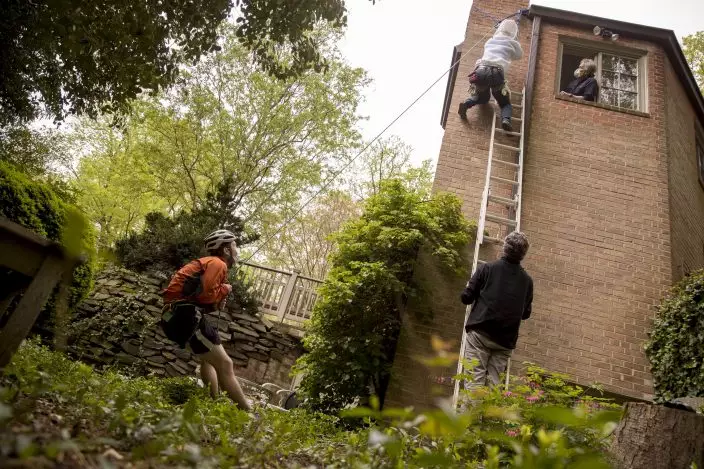
Homeowner Tom Patton, bottom right, stands next to rock climber Paul Stanton, left, as he belays his beekeeper friend Erin Gleeson, top left, as she works with fellow beekeeper Sean Kennedy, right, to try to find a swarm of honey bees that has gone into an attic space, Saturday, April 25, 2020, in Washington. (AP PhotoAndrew Harnik)
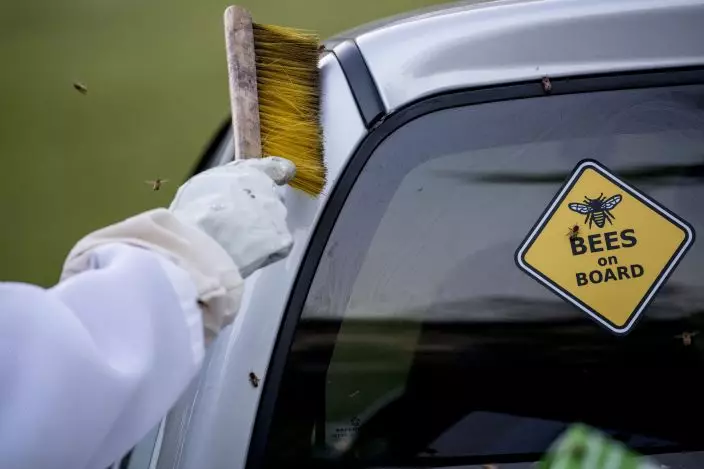
Beekeeper Sean Kennedy brush bees off of his truck after setting up a new hive at the corner of the Swiss residence where Jacques Pitteloud, the Swiss ambassador to the U.S., has offered space for new hives for captured swarms of honeybees in Northwest, Monday, April 20, 2020, in Washington. “Bees are not aggressive unless you invade their home or step on them,” Kennedy says. “But they do put people off. Some people are just innately afraid of things that sting and maybe that’s primal and necessary but if you have them in your office building or you have them in your tourist spots, they become a problem. So, it’s good to catch them in that middle step when we can just put them somewhere where they are welcome.” (AP PhotoAndrew Harnik)
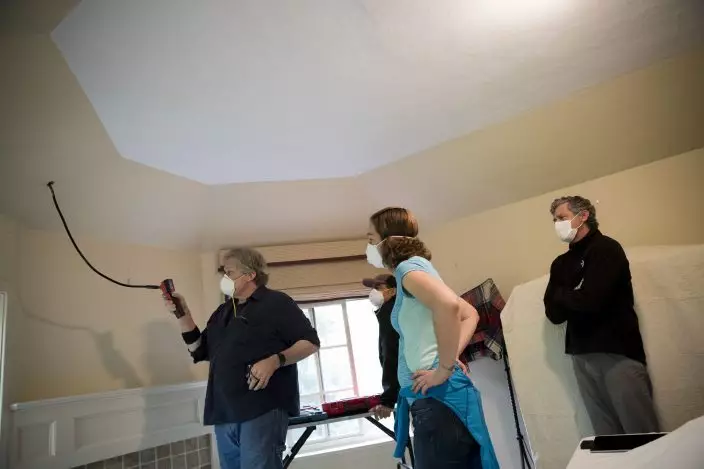
Homeowner Tom Patton, right, watches as beekeepers Sean Kennedy, left, and Erin Gleeson use a thermal camera to search for a swarm of honey bees that has gone into an attic space, Saturday, April 25, 2020, in Washington. The District of Columbia has declared beekeepers as essential workers during the coronavirus outbreak. If the swarm isn’t collected by a beekeeper, the new hive can come to settle in residential backyards, attics, crawlspaces, or other potentially ruinous areas, creating a stinging, scary nuisance. (AP PhotoAndrew Harnik)
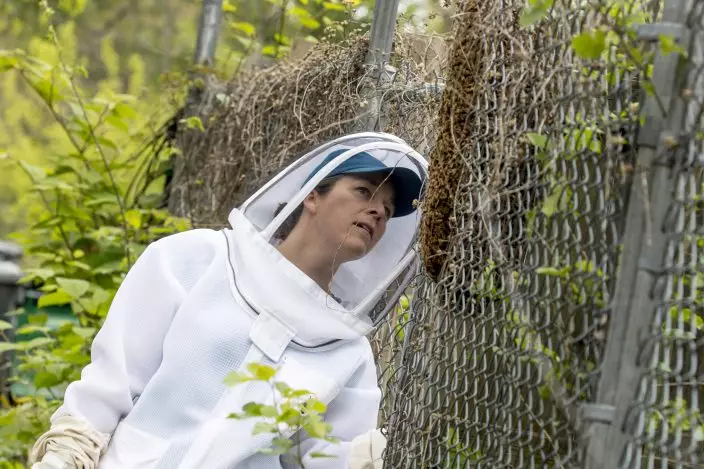
Beekeeper Erin Gleeson prepares to relocate a swarm of honeybees on a fence line in a neighborhood in Anacostia, Monday, April 20, 2020, in Washington. (AP PhotoAndrew Harnik)
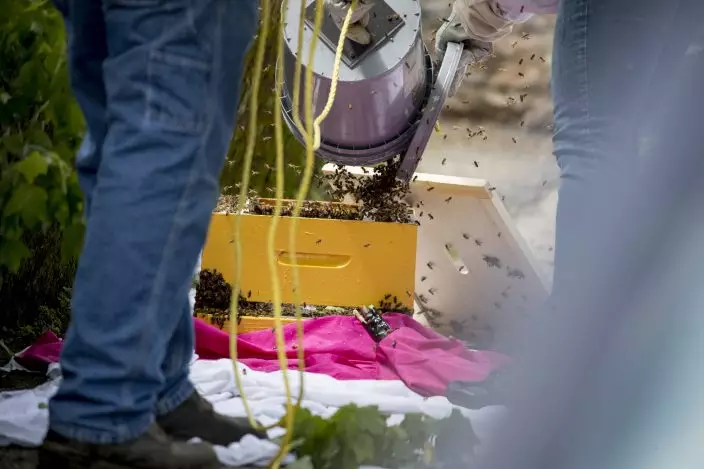
Beekeeper Sean Kennedy, uses a specially made bucket on a stick to capture a swarm of honey bees and relocate them to a bee hive, Friday, May 1, 2020, in Washington. (AP PhotoAndrew Harnik)
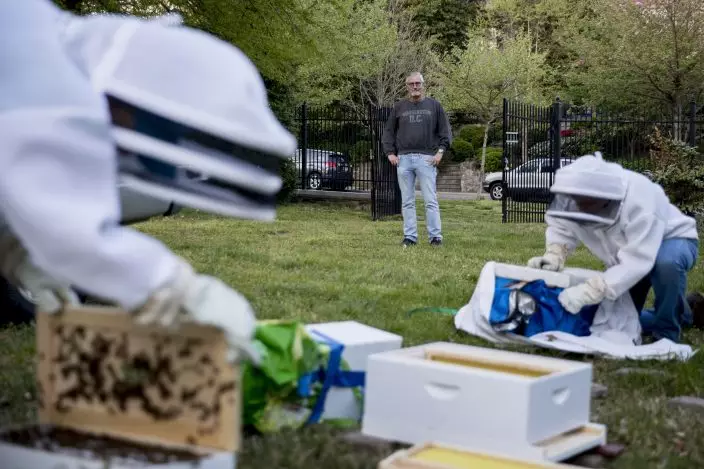
Jacques Pitteloud, the Swiss ambassador to the U.S., center, watches as beekeepers Sean Kennedy, right, and Erin Gleeson, left, set up hives at the corner of the Swiss residence where the ambassador has offered space for new hives for captured swarms of honeybees in Northwest, Monday, April 20, 2020, in Washington. (AP PhotoAndrew Harnik)
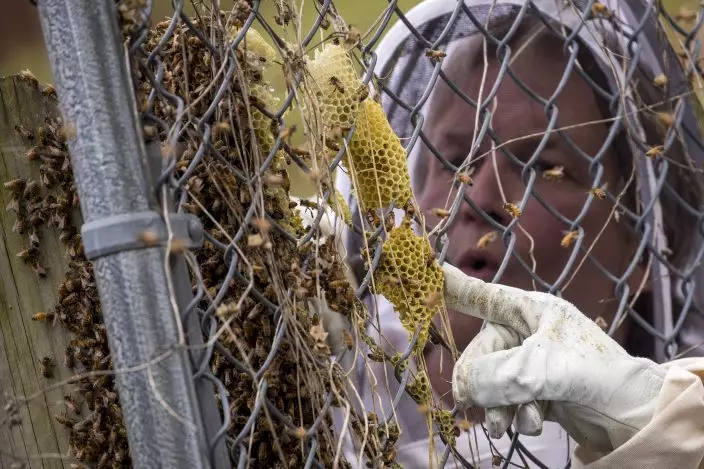
Honeycomb is visible as beekeeper Sean Kennedy works to relocate a swarm of honeybees from a fence line in a neighborhood in Anacostia, Monday, April 20, 2020, in Washington. (AP PhotoAndrew Harnik)
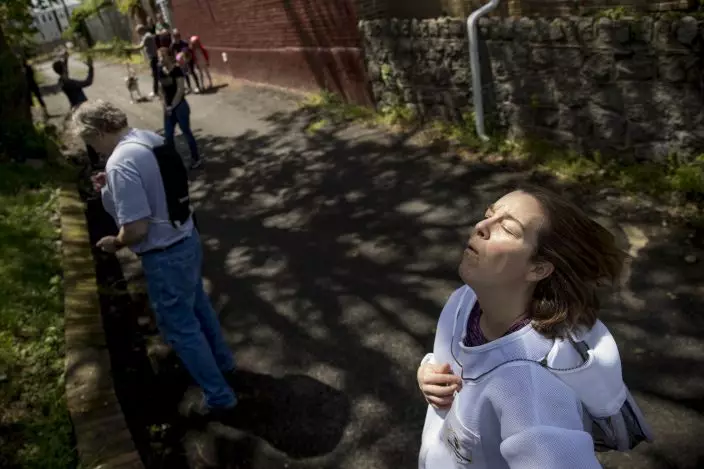
Beekeeper Erin Gleeson takes a deep breath as she takes off her mask after capturing a swarm of honey bees to relocate them to a bee hive, Friday, May 1, 2020, in Washington. The District of Columbia has declared beekeepers as essential workers during the coronavirus outbreak. If the swarm isn’t collected by a beekeeper, the new hive can come to settle in residential backyards, attics, crawlspaces, or other potentially ruinous areas, creating a stinging, scary nuisance. (AP PhotoAndrew Harnik)
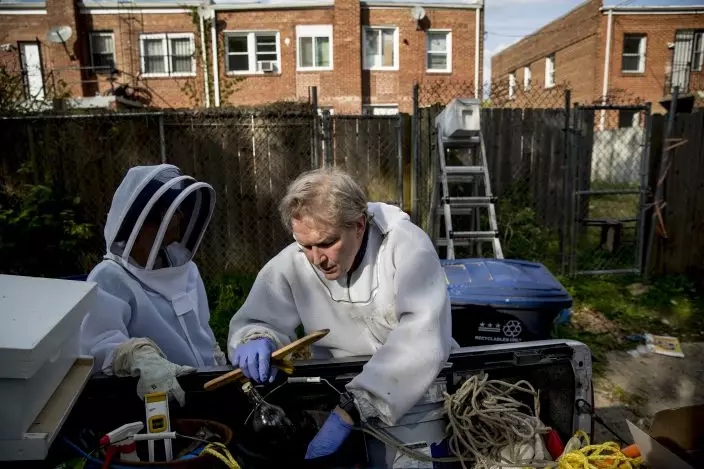
Beekeepers Sean Kennedy, right, and Erin Gleeson, left, pack up as they finish removing a swarm of honeybees from a fence line in a neighborhood in Anacostia, Monday, April 20, 2020, in Washington. The District of Columbia has declared beekeepers as essential workers during the coronavirus outbreak. If the swarm isn’t collected by a beekeeper, the new hive can come to settle in residential backyards, attics, crawlspaces, or other potentially ruinous areas, creating a stinging, scary nuisance. (AP PhotoAndrew Harnik)
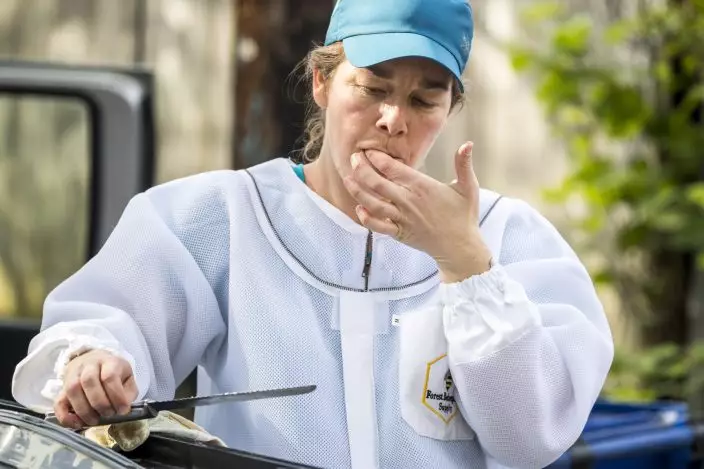
Beekeeper Erin Gleeson licks honey from a knife after helping to remove a swarm of honeybees from a fence line in a neighborhood in Anacostia, Monday, April 20, 2020, in Washington. (AP PhotoAndrew Harnik)
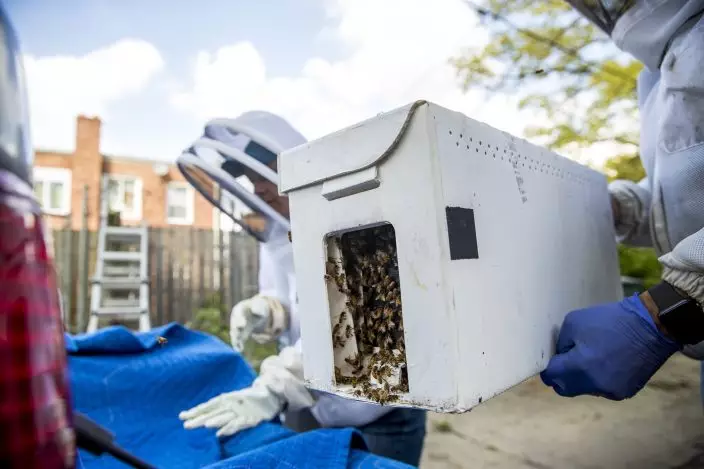
Beekeepers Sean Kennedy, right, and Erin Gleeson, left, pack up a bee box full of honeybees they removed from a fence line in a neighborhood in Anacostia, Monday, April 20, 2020, in Washington. Over the last year, beekeepers in the U.S. lost 43.7% of their honeybee colonies, according to the Bee Informed Partnership. (AP PhotoAndrew Harnik)
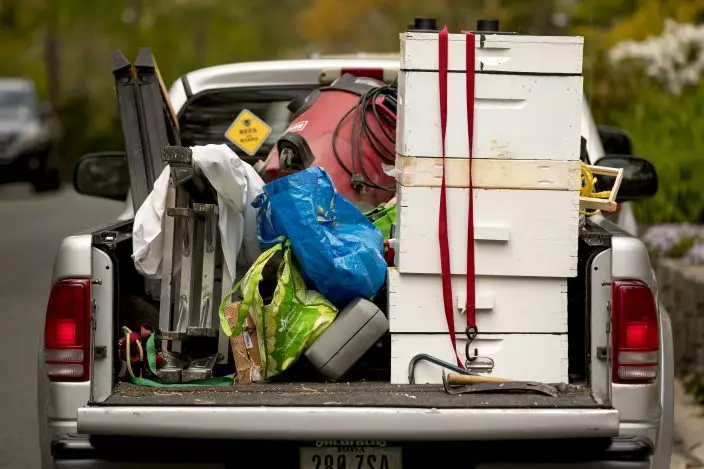
Various tools and bee boxes are visible in the truck of beekeepers Sean Kennedy and Erin Gleeson as they inspect a swarm of honey bees, Saturday, April 25, 2020, in Washington. The District of Columbia has declared beekeepers as essential workers during the coronavirus outbreak. If the swarm isn’t collected by a beekeeper, the new hive can come to settle in residential backyards, attics, crawlspaces, or other potentially ruinous areas, creating a stinging, scary nuisance. (AP PhotoAndrew Harnik)


